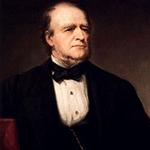
Samuel Blatchford (1882-1893)
Samuel Blatchford lived from 1820 to 1893.
Early Life and Legal Career
Blatchford was born in Auburn, New York, where his father was a well-known attorney. He began attending Columbia College at the age of thirteen, where he was a member of the Philolexian Society. He graduated from Columbia at age seventeen.
In 1840, Blatchford served as private secretary to Governor William H. Seward. While working under the governor, Blatchford read law, and eventually entered into private practice with his father and uncle. In 1854, he moved to New York City, where he started the law firm of Blatchford, Seward & Griswold–now known as Cravath, Swaine & Moore. Blatchford developed a reputation for preparing summaries of United States circuit court cases, and served as reporter of decisions for the Circuit Court in New York. In addition, he developed a successful admiralty and patent law practice.
In 1867, President Andrew Johnson appointment Blatchford to a seat on the United States District Court for the Southern District of New York. In 1878, President Rutherford B. Hayes promoted Blatchford to serve as Circuit Judge of the Second U.S. Judicial Circuit.
Appointment to the Supreme Court
In 1882, Blatchford was nominated to the Supreme Court by President Chester A. Arthur, making him the first person to serve at all three levels of the federal judiciary: as District Judge, Circuit Judge, and Supreme Court Justice.
Blatchford spent eleven years on the bench, writing 430 opinions and two dissents. His most famous opinions include Chicago, Milwaukee & St. Paul Railway Co. v. Minnesota and Budd v. People of New York. However, both opinions were criticized for their contradictory conclusions regarding the Due Process clause of the Fourteenth Amendment of the U.S. Constitution.
Death
Blatchford died on July 7, 1893 in Newport, Rhode Island, at the age of seventy-three.
Notable Cases
Chicago, Milwaukee & St. Paul Railway Co. (1890)
Budd v. People of New York (1892)







